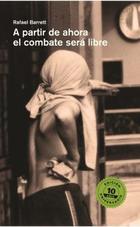His high-pitched voice is sustained "like the injustice he denounces" over the passage of time and fashions, including literary ones. And it is his anarchism the belly in which Rafael Barrett's writing is born, is born and is universalized. His essays, conferences and notes display with irony and certainty his anger and contempt for the owners of the land, the laws and the States, anger that without neglecting the pedagogical work or the literary aesthetics made his word a scourge of the powerful.
The texts that we present today do not therefore constitute a novelty, beyond the careful selection and rigorous preliminary study of Santiago Alba Rico, but an act of justice. You always have to go back to Barrett. Every now and then we editors must pay attention to these texts that should not, like daily bread, be absent from daily reading.
All book titles by this author
|
Title |
Price | ||
|---|---|---|---|
|
|
A partir de ahora el combate será libre Author: Rafael Barrett Publisher: Madreselva |
$385.00 |
Shopping cart
Loading cart
Important notices
|
|
Recordando a André Rouillé: Su legado en la fotografía André Rouillé 1948 - 2025 |
|
|
Libros de filosofía y co. Disponibles en Librería Herder |
|
|
Revista Filosofía & Co. nº 9 Nueva revista de filosofia divulgativa y actualidad |
|
|
"Espacios de la filosofía" - Mauricio Beuchot - Novedad Herder México |
|
|
Revista Filosofía & Co. nº 8 Nueva revista de filosofia divulgativa y actualidad |
Pay safely with:


In the webshop
New
|
|
Medios calientes 70159 $400.00 -0.00% $400.00 |
|
|
En busca del español correcto 70074 $400.00 -0.00% $400.00 |
|
|
Regresar afuera 70148 $275.00 -0.00% $275.00 |
|
|
Simone de Beauvoir 70149 $230.00 -0.00% $230.00 |
|
|
Los tres cuerpos 70427 $360.00 -10.00% $324.00 |
In the press
Promotions
|
|
Panorama A1.1, Deutsch als Fremdsprache Übungsbuch 36726 $235.00 -35.00% $152.75 |
|
|
Prosa y poesía. Homenaje a Gonzalo Sobeja 70242 $1,755.00 -25.00% $1,316.25 |
|
|
Lingüística española aplicada a la terapia del lenguaje 70239 $300.00 -25.00% $225.00 |
|
|
Introducción a la filosofía 70243 $620.00 -25.00% $465.00 |
|
|
Historia del arte I 70244 $1,545.00 -25.00% $1,158.75 |







